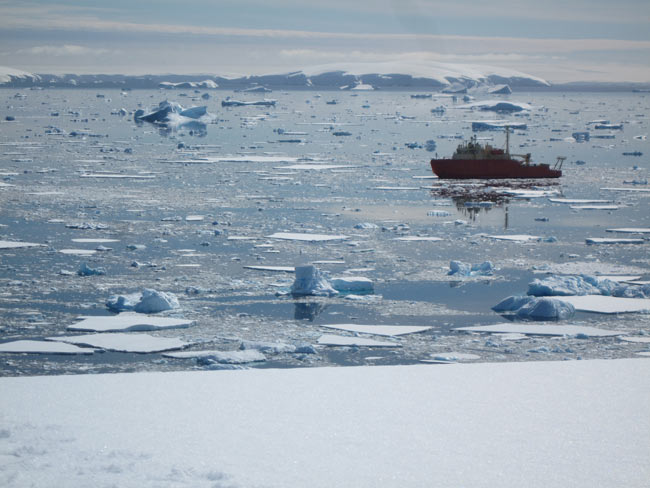The warming climate affects the Antarctic food chain
Rapid climate change on the Antarctic Peninsula has caused simultaneous changes in the region's biological productivity. This is the finding of a new study that explains why some species of penguins and other animals that live in the area are declining.
The western part of the Antarctic Peninsula (the northernmost part of the continent) heats up about 4.5 degrees Fahrenheit (equivalent to 2.5 degrees Celsius) during the past 30 years, this increase is greater than the temperature rise. any area simultaneously reduces the area of sea ice.
The rise in temperature causes changes from cold, dry climates to warmer climates, wetter conditions at least in the northern part of the peninsula in the past decades.
Along with this local temperature change, the researchers also found populations of Adélie penguins and krill - both species thrive in cold and dry climates - moving back to south (towards the pole). Meanwhile, other species, especially Chinstrap penguins, are slowly taking over the northern regions.

The icebreaker boat is owned by the Natural Science Foundation, which locates the seas near Palmer Station.Palmer Station is located in the western part of the Antarctic Peninsula.These clear days are very rare in Antarctica because clouds almost always cover the sky.(Photo: Science / AAAS)
Martin Montes - Hugo of the University of Rugers, New Jersey with his colleagues said that the migration of penguins could be related to changes in the root of the Antarctic food chain, that is plankton.
Using satellite data and field studies over the past 30 years, researchers have determined that plankton in the western Antarctic Peninsula has declined by 12% during the study period. .
Montes - Hugo said: 'For the first time we have shown that there is an ongoing transformation of the amount and composition of plankton in the western part of the Antarctic Peninsula, which is related to long-term climate change. Changes related to plankton may partly explain the observed decline of some penguin populations'.
The results of the study were partially funded by the Natural Science Foundation, published in the March 13 issue of Science.
The team member, Hugh Ducklow, of the Marine Biology Laboratory in Woods Hole, Mass., Said: 'We now know that climate change impacts the root of the food web, and spreads. radiating to the entire food chain '.
- Climate change affects life on the Antarctic Peninsula
- Climate change affects food supply
- Climate change impacts the food chain in the oceans
- Find the answer to Antarctic paradox
- People are not the only factor causing climate change
- What mystery makes the Antarctic ice sheet green?
- Climate change seriously affects the poor
- Unexpected discovery of the thickness of the Antarctic ice sheet
- Research on global warming through petrography
- 'Love food' will be more expensive due to climate change
- The warming Earth makes Antarctica more and more green
- The Antarctic ice shelf shattered, threatening to drown many cities
 Is the magnetic North Pole shift dangerous to humanity?
Is the magnetic North Pole shift dangerous to humanity? Washington legalizes the recycling of human bodies into fertilizer
Washington legalizes the recycling of human bodies into fertilizer Lightning stone - the mysterious guest
Lightning stone - the mysterious guest Stunned by the mysterious sunset, strange appearance
Stunned by the mysterious sunset, strange appearance